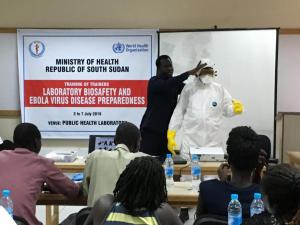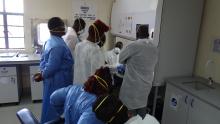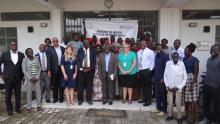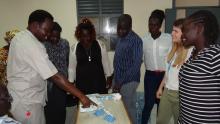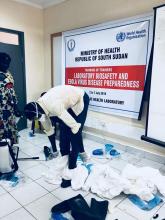WHO strengthened the National Public Health Laboratory to safely manage infectious specimens in South Sudan
Juba 6 July, 2018 – South Sudan is prone to emerging and re-emerging disease outbreaks which necessitate prompt and safe management of laboratory specimens to ensure accurate and timely confirmation of the causative agent such as Ebola Virus to guide the response.
However, the Joint External Evaluation (JEE) of IHR (2005) core capacities for South Sudan conducted in 2017, revealed that capacity for biosafety and biosecurity needed strengthening and the gaps identified addressed.
Following the confirmed outbreak of Ebola Virus Disease in Democratic Republic of Congo, the Ministry of Health with support from the World Health Organization (WHO) and other partners scaled up implementation of the JEE recommendations to mitigate the risk of possible cross boarder importation of EVD. This among others included strengthening laboratory capacity to respond to this threat and any other outbreaks over and above the already strengthened capacities to provide confirmatory testing for at least 5 out of the WHO’s 10 core recommended tests, including HIV, TB, malaria, measles, meningitis, and cholera.
‘Thanks to Global Fund, ECHO, CDC and USAID, South Sudan has made progress in building and strengthening the laboratory capacity to test and report results in a safe, secure, timely and reliable manner for outbreaks and emergencies, the challenging circumstances notwithstanding said Evans Liyosi, WHO Representative for South Sudan. He noted that this development is in line with the expectations of the WHO Laboratory Improvement for Emergencies (LIFE) initiative and the International Health regulations, for vulnerable WHO member states including South Sudan.
With WHO's Contingency fund for emergencies(CFE) and technical support from WHO AFRO and Lyon, a six-day training of trainers for laboratory biosafety and Ebola virus disease preparedness was held at the Central Public Health Laboratory in Juba.
Dr Lul Lojok Deng, the Director General of the Public Health laboratory and National Blood Transfusion Services appreciated the support from WHO. He noted that "this being the first training of its kind in South Sudan, it will greatly improve the capacity of the laboratory staff. Dr Deng pledged commitment of the Ministry of Health to roll out the training to strengthen preparedness at national and sub-national levels, as part of the catch-up plan for South Sudan's laboratory network.
A total of 20 medical laboratory staff including state laboratory focal persons drawn from national and state level laboratories were trained on practical use of personal protective equipment in the laboratory setting and how to safely manage samples from suspected cases of Ebola, based on international best practices. Besides rapid diagnostic tests, use of specialist equipment, aseptic technique, laboratory audits, the training also introduced participants to new molecular diagnostic techniques, to build capacity to test for Ebola Virus and other highly infectious pathogens in the country. This is also in preparation for the introduction of the WHO Influenza and Pandemic Response programme in South Sudan, supported by WHO AFRO.
When interviewed, participants felt that they were more prepared and confident to handle samples of suspected viral haemorrhagic fevers and other highly infectious pathogens in the laboratory and better able to protect themselves and ensure biosafety to the community. It is anticipated that over the coming months that this training will be rolled out countrywide.
Tel : +211923362401
Email: wamalaj [at] who.int (wamalaj[at]who[dot]int)
Tel : +211922135555 or +211916097828
Email: ramadano [at] who.int (ramadano[at]who[dot]int)
Tel : +211 956 991 637
Email : chitsvaja [at] who.int (chitsvaja[at]who[dot]int)



